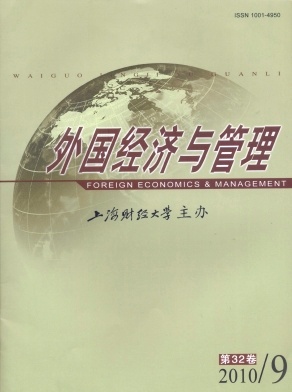基于不同视角的组织复杂性界定及测量研究评介与比较
外国经济与管理 2010 年 第 32 卷第 09 期, 页码:1 - 9
摘要
参考文献
摘要
本文通过文献梳理把组织理论研究领域关于组织复杂性内涵界定及测量的不同观点分为结构、行为和认知三种,并对它们进行了评介和比较,以期探索学术界对组织复杂性问题认识的发展过程,并为后续研究提供参考和依据。
[1]Chapman,G.Evolutionary psychology,complexity theory,and quantitative social epistemology[J].Futures,2007,39(9):1 067-1 083.
[2]Rybakov,L A.Environment and complexity of organizations[J].Emergence,2001,3(1):83-94.
[3]Moldoveanu,M.Aninter-subjective measure of organizational complexity:Anewapproach to the study of complexityin organi-zations[J].Emergence,2004,6(1):9-26.
[4]Damanpour,F.Organizational complexity and innovation:Developing and testing multiple contingency models[J].ManagementScience,1996,42(5):693-716.
[5]Boisot,M,and Child,J.Organizations as adaptive systemsin complex environments:The case of China[J].Organization Science,1999,10(3):237-252.
[6]Ashmos,D P,Duchon,D,and McDaniel,RJr.Organizational responses to complexity:The effect on organizational performance[J].Journal of Organizational Change Management,2000,13(6):577-594.
[7]Anderson,P.Complexity theory and organization science[J].Organization Science,1999,10(2):216-232.
[8]Lissack,MR,and Letiche,H.Complexity,emergence,resilience,and coherence:Gaining perspective on organizations andtheirstudy[J].Emergence,2002,4(1):72-94.
[9]Moldoveanu,MC,and Bauer,R.On the relationship between organizational complexity and organizational structuration[J].Or-ganization Science,2004,15(1):98-118.
[10]Levinthal,D,and Warglien,M.Landscape design:Designingfor local actionin complex worlds[J].Organization Science,1999,10(2):342-357.
[11]Kiel,L D.Apri mer for agent-based modelingin public administration:Exploring complexityin administrative worlds[J].PublicAdministration Quarterly,2005,29(3/4):268-296.
[12]Fioretti,G,and Visser,B.Acognitiveinterpretation of organizational complexity[J].ECOSpecial Double Issue,2004,6(1/2):11-23.
[13]Hall,R H.The twenty-first-century firm:Changing economic organizationininternational perspective[J].Contemporary Socio-logy,2002,31(5):546-547.
[14]Browaeys,MJ,and Baets,W.Cultural complexity:A new epistemological perspective[J].Learning Organization,2003,10(6):332-339.
[15]Goodwin,VL,Wofford,J C,and Harrison,D.Measuring cognitive complexityinthe organizational domain[R].Paper presen-ted at the annual meeting of the Academy of Management,San Francisco,CA,1990.
[16]Gigerenzer,G.Bounded rationality:The study of smart heuristics[A].Kochler,D,and Harvey,N(Eds.).Handbook of judgmentand decision making[C].Oxford,UK:Blackwell,2003.
[17]Moldoveanu,MC,and Singh,J V.The evolutionary metaphor:Asynthetic framework for the study of strategic organization[J].Strategic Organization,2003,1(2):439-449.
[18]Goodwin,V L,and Ziegler,L.Atest of relationshipsin a model of organizational cognitive complexity[J].Journal of Organiza-tional Behavior,1998,19(4):371-386.
[19]Ghasem-Aghaee,N,and ren,TI.Cognitive complexity and dynamic personalityin agent si mulation[J].Computersin HumanBehavior,2007,23(6):2 983-2 997.
[2]Rybakov,L A.Environment and complexity of organizations[J].Emergence,2001,3(1):83-94.
[3]Moldoveanu,M.Aninter-subjective measure of organizational complexity:Anewapproach to the study of complexityin organi-zations[J].Emergence,2004,6(1):9-26.
[4]Damanpour,F.Organizational complexity and innovation:Developing and testing multiple contingency models[J].ManagementScience,1996,42(5):693-716.
[5]Boisot,M,and Child,J.Organizations as adaptive systemsin complex environments:The case of China[J].Organization Science,1999,10(3):237-252.
[6]Ashmos,D P,Duchon,D,and McDaniel,RJr.Organizational responses to complexity:The effect on organizational performance[J].Journal of Organizational Change Management,2000,13(6):577-594.
[7]Anderson,P.Complexity theory and organization science[J].Organization Science,1999,10(2):216-232.
[8]Lissack,MR,and Letiche,H.Complexity,emergence,resilience,and coherence:Gaining perspective on organizations andtheirstudy[J].Emergence,2002,4(1):72-94.
[9]Moldoveanu,MC,and Bauer,R.On the relationship between organizational complexity and organizational structuration[J].Or-ganization Science,2004,15(1):98-118.
[10]Levinthal,D,and Warglien,M.Landscape design:Designingfor local actionin complex worlds[J].Organization Science,1999,10(2):342-357.
[11]Kiel,L D.Apri mer for agent-based modelingin public administration:Exploring complexityin administrative worlds[J].PublicAdministration Quarterly,2005,29(3/4):268-296.
[12]Fioretti,G,and Visser,B.Acognitiveinterpretation of organizational complexity[J].ECOSpecial Double Issue,2004,6(1/2):11-23.
[13]Hall,R H.The twenty-first-century firm:Changing economic organizationininternational perspective[J].Contemporary Socio-logy,2002,31(5):546-547.
[14]Browaeys,MJ,and Baets,W.Cultural complexity:A new epistemological perspective[J].Learning Organization,2003,10(6):332-339.
[15]Goodwin,VL,Wofford,J C,and Harrison,D.Measuring cognitive complexityinthe organizational domain[R].Paper presen-ted at the annual meeting of the Academy of Management,San Francisco,CA,1990.
[16]Gigerenzer,G.Bounded rationality:The study of smart heuristics[A].Kochler,D,and Harvey,N(Eds.).Handbook of judgmentand decision making[C].Oxford,UK:Blackwell,2003.
[17]Moldoveanu,MC,and Singh,J V.The evolutionary metaphor:Asynthetic framework for the study of strategic organization[J].Strategic Organization,2003,1(2):439-449.
[18]Goodwin,V L,and Ziegler,L.Atest of relationshipsin a model of organizational cognitive complexity[J].Journal of Organiza-tional Behavior,1998,19(4):371-386.
[19]Ghasem-Aghaee,N,and ren,TI.Cognitive complexity and dynamic personalityin agent si mulation[J].Computersin HumanBehavior,2007,23(6):2 983-2 997.
引用本文
吕鸿江, 刘洪. 基于不同视角的组织复杂性界定及测量研究评介与比较[J]. 外国经济与管理, 2010, 32(9): 1–9.
导出参考文献,格式为:
上一篇:个性化契约研究述评与展望
下一篇:国外团队跨界行为研究回顾与展望





 6738
6738  602
602

